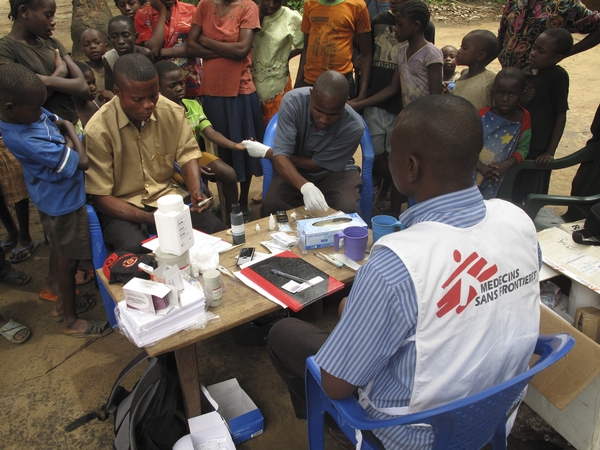Massive Malaria surge in DR Congo requires urgent response

Apr 25, 2012
Triple-fold increase in cases since 2009; MSF can’t meet increasing caseload alone
A massive increase in malaria cases in the Democratic Republic of Congo (DRC) is overwhelming existing prevention and treatment efforts, demanding an urgent and stepped-up response, the international medical humanitarian organisation Médecins Sans Frontières (MSF) said today.
Most of MSF’s health centres and hospitals in DRC have observed a marked increase in malaria cases, including in its severe form. In six provinces (half of the vast country), the number of people treated for malaria in MSF projects was more than 250 percent since 2009. This outbreak is particularly alarming due to the high number of severe malaria patients requiring hospitalization and urgent blood transfusions due to malaria-induced anaemia. Faced with such a wide-scale crisis, MSF is unable to respond alone, the organization announced.
"It is rare to see such a large proportion of patients with severe malaria," said Dr. Jorgen STASSIJNS, a malaria specialist for MSF. "But treatment outside the cities remains especially weak, due to unaffordability or geographic inaccessibility. In some areas health care is simply non-existent. Even when treatment is available, the drugs are sometimes inadequate or outdated," he said.
In response to the massive outbreak, MSF has deployed additional emergency medical teams in four provinces in DRC. In 2009, MSF teams treated more than 45,000 people with malaria. In 2011, more than 158,000 people were treated. So far this year, more than 85,000 people have been treated.
While the exact causes of the outbreak remain uncertain, this new crisis is unfolding in the context of a health system sorely lacking resources at all levels. The country lacks adequate medicines, medical supplies, and properly trained medical personnel. Malaria prevention and screening systems are deficient.
In North Kivu and South Kivu provinces, and recently in the northern area in Katanga province, ongoing insecurity and renewed fighting also prevent people from obtaining health care. In Maniema, Orientale, Equateur, and Katanga provinces, the absence of other health care providers and overstretched health systems leave people vulnerable to contracting malaria.
MSF’s emergency response is saving lives in the short term, but in the longer term the organisation cannot address the crisis alone. MSF calls on the Congolese government and other health-related NGOs (national and international) to take rapid and sustainable prevention and treatment measures to combat this scourge.
Malaria is the leading cause of death in DRC, killing nearly 180,000 children under five, every year.
A massive increase in malaria cases in the Democratic Republic of Congo (DRC) is overwhelming existing prevention and treatment efforts, demanding an urgent and stepped-up response, the international medical humanitarian organisation Médecins Sans Frontières (MSF) said today.
Most of MSF’s health centres and hospitals in DRC have observed a marked increase in malaria cases, including in its severe form. In six provinces (half of the vast country), the number of people treated for malaria in MSF projects was more than 250 percent since 2009. This outbreak is particularly alarming due to the high number of severe malaria patients requiring hospitalization and urgent blood transfusions due to malaria-induced anaemia. Faced with such a wide-scale crisis, MSF is unable to respond alone, the organization announced.
"It is rare to see such a large proportion of patients with severe malaria," said Dr. Jorgen STASSIJNS, a malaria specialist for MSF. "But treatment outside the cities remains especially weak, due to unaffordability or geographic inaccessibility. In some areas health care is simply non-existent. Even when treatment is available, the drugs are sometimes inadequate or outdated," he said.
In response to the massive outbreak, MSF has deployed additional emergency medical teams in four provinces in DRC. In 2009, MSF teams treated more than 45,000 people with malaria. In 2011, more than 158,000 people were treated. So far this year, more than 85,000 people have been treated.
While the exact causes of the outbreak remain uncertain, this new crisis is unfolding in the context of a health system sorely lacking resources at all levels. The country lacks adequate medicines, medical supplies, and properly trained medical personnel. Malaria prevention and screening systems are deficient.
In North Kivu and South Kivu provinces, and recently in the northern area in Katanga province, ongoing insecurity and renewed fighting also prevent people from obtaining health care. In Maniema, Orientale, Equateur, and Katanga provinces, the absence of other health care providers and overstretched health systems leave people vulnerable to contracting malaria.
MSF’s emergency response is saving lives in the short term, but in the longer term the organisation cannot address the crisis alone. MSF calls on the Congolese government and other health-related NGOs (national and international) to take rapid and sustainable prevention and treatment measures to combat this scourge.
Malaria is the leading cause of death in DRC, killing nearly 180,000 children under five, every year.





Leave a Comment